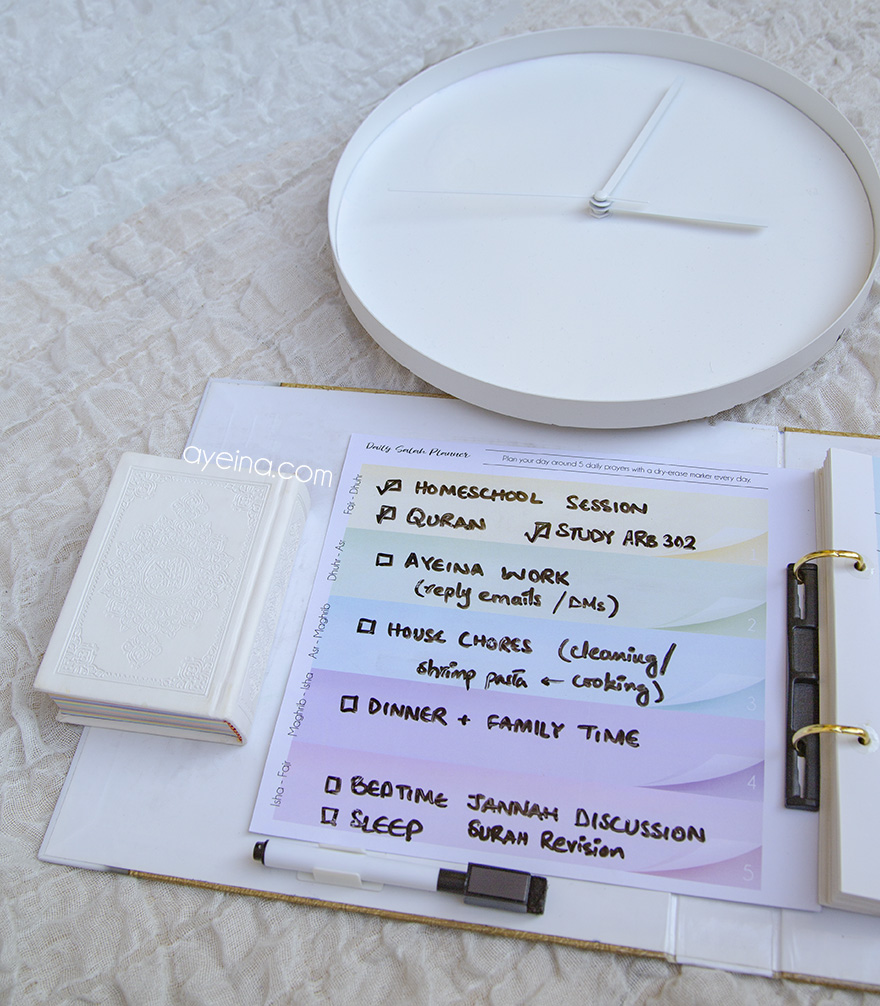The Prophet (ﷺ) said, “The best among you (Muslims) are those who learn the Qur’an and teach it.” [Bukhari]
1) Start with yourself
“To be honest, the biggest tip would be to learn the tajweed yourself if you don’t already know it. This is crucial if you want to get involved with teaching Qur’an to your children. I had re-learnt Qur’an with tajweed a short time before Maariya began her Qa’eda stage. This proved priceless for our hifdh journey to have been successful alhamdulillah. I wouldn’t have had a clue otherwise.” says Shabnam.
2) Know their learning style
“We were advised to listen to Sheikh Husary first, but to be honest, we both preferred Sheikh Mishary Rashid! Maariya would listen to Juz Amma at bedtime and in the car.” says Shabnam. We usually underestimate kids on how they absorb everything they listen to. Hence try to keep them in such environment as much as possible. You will find yourself memorizing the surahs as well this way. Playing Quran recitation around the home may help them memorize unconsciously sometimes as well – especially if they are aural learners and you know your child best! The more time you spend with them, the more you’ll be able to get to know them ♥️
Some kids are aural learners. They learn best when they listen. Some children are visual learners so they learn best when they see. Young kids (especially) are kinaesthetic learners hence they learn best when they practically do things. While some kids are mixture of 2 or all styles. If you are finding it hard to get them to memorize through oral practice, try doing tafsir with them to see if they can memorize better when they know WHAT they are memorizing. Memorization of Quran isn’t a necessity (not all sahaabas were huffadh), but understanding Quran is – so doing translation/tafsir with them will help them bond with their Lord better which will eventually help them stay motivated to memorize in shaa Allah. Also, it will help them not mix the similar verses together because as they progress, it will get complicated.
View this post on Instagram
Tips for AURAL learners: You can let them play quietly or do some colouring while the Quran is played in the background. Aural learners are the best because they can learn passively as well. Repeat the verses yourself as well when you lie down with them at night – to put them to sleep. That’s the time when they are least distracted. You can also take the help of audio recitation if you don’t know the verses yourself. You may also try this hifdh audio session with Asma Huda (unfortunately only for juz 30 – but it’s a good start). (some instructional clues are in urdu, but one can do it without knowing urdu as well).
Tips for VISUAL learners: Try to encourage kids to write the verses that they are trying to memorize (you will also be able to add some copywork in like this). When they are reciting the Quran, ask them to put their finger on the verses they are reciting. Keep the same Quran throughout their memorization journey so they can form a picture memory of it (usually people use 15 liner Quran for hifdh). Wrap their Quran in pretty colours so they can truly call it their own. My 6 year old wrapped her Quran in pink and purple wrapping sheet (but it didn’t stay in place for long), so getting a pink Quran with pink pages helped. You can also look into a Rainbow Quran.
Tips for KINESTHETIC learners: You can use signs and gestures to convey the message better along with explaining them through translation and simple tafseer. For eg: while reciting chapter 93 – Surah Duha (as seen in the above video), my 4yr old does a thumbs up sign 👍 for *fatardaa* (satisfied) & whenever “laa” (no) comes, she moves her finger ☝️ (See the video for better perspective on this). Prophet (ﷺ) used to take help of gestures to explain the ahadith better. For eg in THIS hadith (in Bukhari) “A believer to another believer is like a building whose different parts enforce each other.” The Prophet (ﷺ) then clasped his hands with the fingers interlaced (while saying that).
3) Start early if possible
Many people ask: “What age do we start teaching kids Quran?” You know your child best and you can try as early as 2 even. An innocent heart free of a lot of sins can absorb khair in them much better. Some kids learn to speak early while some take time. But whatever age or stage they are at, nurturing love for Allah as a foundation can really help you get things rolling. Depending on the child’s ability and your effort, it may take 2-10 years to completely memorize the Quran.
“Maariya was turning 5 when she started her Qa’eda stage. She had just started reception at a ‘normal’ school. Maariya duly started the short Surahs of Juz Amma at the Arabic School. I was happy to get Maariya ready so a qualified teacher can ensure her correct tajweed and makhaarij. Maariya finished her Juz Amma in about 2 months without any real push. I realized then that we should think about her hifdh more seriously. At this stage, I decided to teach her myself and try for Hifdh” says Shabnam.
You may start from the start as well – 1st juzz instead of 30th juzz (amma para). Please make sure you have age-appropriate expectations from your children to avoid constant frustration. Also know that each child is different so what works for one may not work for another one, but also remember that it’s never too late to start. I have seen women as old as 80 memorizing the Quran so read the inspirational stories to stay motivated yourself too.
View this post on Instagram
4) Get involved as much as you can
5) Repeat / Revise as often as you can
The Prophet (ﷺ) said, “Keep on reciting the Qur’an, for, by Him in Whose Hand my life is, Qur’an runs away (is forgotten) faster than camels that are released from their tying ropes.” [Bukhari]
View this post on Instagram
6) Remove distractions that take up the mind space
Remember the advice by Ibn al Qayyam – for a better memory, do istighfar.
If your child is having a hard time giving up distractions, keep them encouraged with the WHYs! Like narrating them the following hadith:
“Prophet (ﷺ) said: “It shall be said – meaning to the one who memorized the Qur’an – ‘Recite, and rise up, recite (melodiously) as you would recite in the world. For indeed your rank shall be at the last Ayah you recited.'” [Tirmidhi]
7) Keep a Quran log and you may reward your child when they may need extra encouragement
“From the very start, I used to make a note of what we did on a daily basis. I would write which ayahs we covered. The main reason was to log the mistakes that were made. It is crucial that they are revisited the next day to ensure the same mistakes aren’t made again. The early stage was a lot easier to retain because it was a manageable amount.” says Shabnam.
If your child is finding it hard to start, try the reward system. It specially works well with younger children who may not understand why this is important. For eg: if you are starting at the age of 3, giving them gifts on each milestone can help them keep going.
Allah’s Messenger (ﷺ) said, “If Allah loves a person, He calls Gabriel, saying, ‘Allah loves so and so, O Gabriel love him’ So Gabriel would love him and then would make an announcement in the Heavens: ‘Allah has loved so and-so therefore you should love him also.’ So all the dwellers of the Heavens would love him, and then he is granted the pleasure of the people on the earth.” [Bukhari]
8) Organize better so you get uninterrupted time with your child
“Maariya has a younger sister, Sara, and a younger brother Yusuf too. I just made sure all necessary duties were taken care of so I could sit with Maariya without any interruptions.” says Shabnam.
The best time to do this is usually the first thing after breakfast when kids’ mind and energy levels are at their peak. (If they can get up for Fajr happily, then that time is full of barakah – but don’t force them of course. After all, they are only kids who will thrive the best in a loving environment). If you can start at tahajjud time, even better.
Whichever schedule you choose, you must stick to it, and only rarely for special cases should you move it around. If you are not concerned about the time it will take them to complete hifdh, then you can mold your schedule accordingly.
9) Create a learning environment and make Qur’an relatable/ understandable
“Throughout our Qur’an learning, we sat in a quiet room for Hifdh or revision. We never sat where there were other people to distract us or the television blasting! I think this was the key. We had a designated, comfortable and quiet area to memorize and practice. Even other kids knew it was ‘Reading Time’.” says Shabnam.
You can tell a story of what’s actually happening in the Surah. Discuss how these verses were revealed. Share a lesson on how these ayahs apply in our daily lives. You know what that means right? You have to do some learning yourself first. Because that will be the best way your child gets exposure to such knowledge.
View this post on Instagram
10) Consistency and routine is the key to success so keep making dua
Joining online Quran classes for kids ensures consistency in their Quranic learning by providing accessibility and flexibility. These classes eliminate travel constraints, enabling children to participate from home and easily maintain a regular schedule. This convenience fosters a habit of consistent learning, contributing to their Quranic education.
“Give them a platform: one of the best and most effective ways to learn is to teach. Let them take the platform once in a while to teach you, the family, or younger kids about something they learned. It can be something simple around dinner time or it can be something more prepared like a halaqa at the masjid. Empower your children, listen to them, and trust them. They will surprise you.” says Shabnam.
Don’t give up on them and don’t let them give up on themselves. They can do it and so can you! In shaa Allah! Your growth mindset will help them grow too (in shaa Allah we will talk about mindsets from an Islamic perspective soon). Your role in this journey is a VERY important one because YOU are going to set goals for your child. YOU are going to make them your own goals.








I ensure that we read the surahs they have learnt at bed time. I make it interesting such that we all read together including my little boy and by so doing, he has also started reciting alone. We see and listen to stories of the Prophets together and with that I am able to instill some lessons into them. May Allah ease our affairs.
Ameen! Masha Allah, you’re doing it great. May Allah reward you for every step you take towards helping your kids memorize His Book! Ameen!
Beautiful article. Masha’Allah. We have a daily family get together to practice what we have memorised, taking it in turns to recite from the surah we are working on.
Great advice for parents to make dua for their little ones to memorise Allah’s beautiful words. May Allah help us all to memorise His book. Ameen.
Ameen! That’s amazing mashaAllah! Having a family halaqah is wonderful. May Allah bless you and your family !
Assalamualaikum sis.
Masha’a Allah great tips!! Pls suggest ideas when teaching multiple kids.
Pls can u pm me
walaikum assalam. The best thing about having elder siblings is that they can teach the younger ones themselves and little ones really look upto them so they usually learn even unconsciously alhamdulillah (if they are aural learners). Let the younger ones sit/play around (as long as it’s not a noisy play – perhaps let them draw/paint) while you are teaching the elder ones. What are their ages? 🙂
Mashallah. Great article. Jazakallahu khairan kaseer for this. Please remember us in your duas as well.
Wa iyyaki dear! May Allah shower His blessings in abundance upon you and your family and may He ease memorising the Quran for you all Ameen!
I started teaching my daughter qaida the day she turned two. Now she has started hifz with her twin brothers. Alhamdulillah
Masha Allah La quwwata illa billah! May Allah shower His blessings upon you and your family
Masha Allah, May Allah always help they retain what they have memorized.
What a great topic and amazing points mashAllah! #7 is such a great idea, never thought of that, but it would be really helpful to keep a log! May Allah bless this sister for sharing her tips and may she be rewarded for all of her efforts, ameen!
SubhanAllah ! I so needed this advise. My daughter attends an Arabic school where they are currently memorizing juz amma. I struggle to revise with her as she finds difficulty concentrating. She learns fast barakallah but revision is the problem. It gets frustrating for both of us. Inshallah will follow all the advise in here.
These are awesome tips shukran for sharing! It’s extremely hard for children memorizing the Quraan, may Allah make it easy for them and grant parents patience. I notice a lot of parents tend to put a lot of pressure on children to complete, balance Islamic studies with School and it can be very hard for them. (www.spicyfusionkitchen.com)
An amazing article with Useful information that helps people. I read the Quran every day, and so my soul rejoices
I am always wary to help my daughters memorise as my own tajweed is incorrect so I am having lessons myself to correct mine.
I always worry though about young children having that pressure to memorise the whole Quran which is why I haven’t attempted it with my children. My eldest knows some surahs and my youngest is learning some with her Quran tutor now, will see how she does.
Consistency, repeating and revising as well as getting involved as much as she could was my mum wrapped up in one trying to reach three girls all nearly the same age how to remember their Surahs. I remembered more from my mums teaching than I ever did at mosque!
MashaÁllah what an amazing guide to helping your child memorize the Holy Qu’ran. I can’t wait to grow my family and to create such a lovely home such as this inshaÁllah. May God reward you for your efforts. For the time being, I can get into the habit of daily Qur’an memorization for myself!
Agree with your first point. Whatever you want your children to do you should start doing that yourself. MashaAllah very good article..I’ll share it with my friends and family.
Subhanallah this was so very beautiful! Motivated me to strive harder to learn the Quran better and teach my children better inshaAllah. We used to repeat several surahs to our son from the start without any intention of making him memorise. We were surprised to find him reciting Surah Fateha out of nowhere when he was 2.5 years old. Even though the tajweed was off but Alhamdulillah. I now try to recite more and have the Quran played more around the house. The best thing is I am getting to memorize and correct myself along with him. Alhamdulillah
MashaAllah a very insightful article. I have a toddler who just turned one now and while we still seem a little far off from actually memorizing the Qur’an, I believe it is important for us to set an environment from the very beginning. Like ensuring that there are no distractions such as music and television as mentioned in point six.
This is a very inspiring piece and i have specifically understood that consistency in reciting the Quran , scheduling , and learning the meanings are key to achieving hifz with a child . I also agree that the goal should be for a child to memoriseband understand . May Allah bless us with the best of intentions and implementation plan , Amin . Thank you so much for this
I agree that with consistency n routine Is the key to success..my child had memorized Quran at the age of 12 n it was possible due to the routine that was followed with consistency n other point is to have a believe in ur child that he or she will do it n ur believe in him /her will make them believe in achieving goal in their life .
aslamalakum. my boy is in 6 class he completed one and half para with school. do u know any competent qari who teach my child hifz on onlin. i am wating for ur reply please as soon as possible
Jazakillahu khair for the post. I was really looking for some encouragement to start working on my girl…. It’s amazing how much we first need to work on our confidence and trust ourselves before we start a journey like such with our children…
Mashallah My daughter started to memorize the quran, please include her in your prayers !!!
!
Excellent post
Ma sha Allah
This is an excellent post
Mashallah, a very helpful post for parents for teaching the Quran to their kids.
Please can you let me know where did you start the memorizing for your child? Ate you following a book or the Quran? I want to teach my kids hifdh and memorizing quran and I I don’t know where to begin. They learn ayat by ayat but I want to know from where I should start. Jazakallah khair
Salam everyone
All your comments and experiences shared are amazingly encouraging. I would like to know if anyone can share details of any madrasa / school with proven successful hifz system. I would like to enroll my daughter and possibly relocate to anywhere in UK to help with her real life learning .
Jazakallah Khair
Any help Wil be greatly appreciated
walaikum assalam. I personally don’t know any but I hope that someone out there reads your message and is able to help you in shaa Allah.